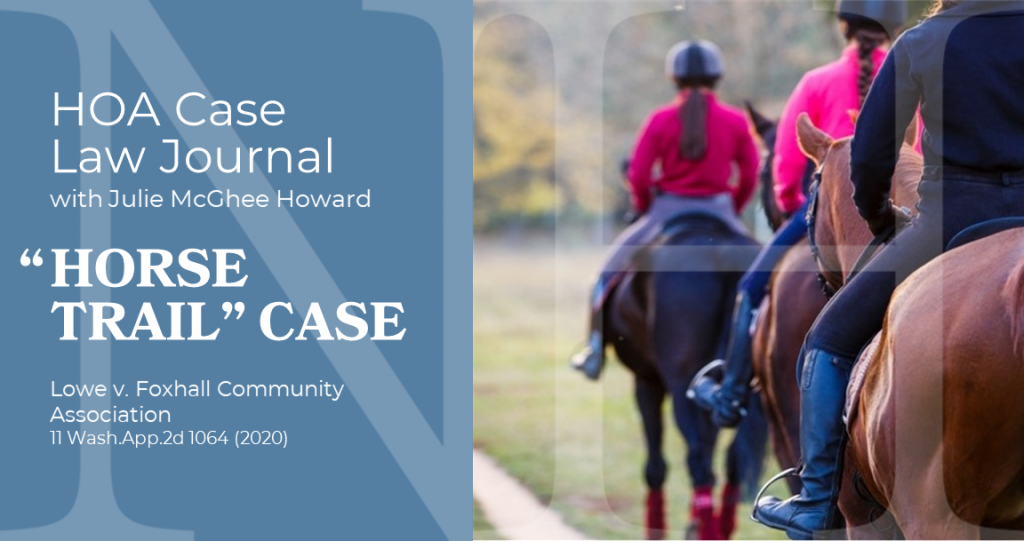HOA Case Law Journal
with Julie McGhee Howard
Lowe v. Foxhall Community Association, 11 Wash.App.2d 1064 (2020)
When Present and Proxy Collide: A Washington Appellate Court Case.
HOA governing documents typically can be amended, including to change how members may use the community property. However, it is critical to understand the process required to amend the documents effectively. In Washington state, an appellate case highlighted the need to clearly understand the precise language of the governing documents to make changes to them. This case illustrates the difficulty HOAs and their members can encounter when changing governing documents and assumptions are made without careful consideration or observation of the precise terms of the documents and applicable case law.
The Facts:
Foxhall is an equestrian friendly community where many residents board their horses and use the community’s horse trails.
One of the residents started a business on his property boarding horses, including for nonresidents, who then started using the community horse trails when they came to ride their horses.
While nothing in the governing documents for the HOA restricted or limited the resident’s boarding business and these nonresidents’ use of the trials, it did create an unplanned and unforeseeable change in how the Foxhall residents experienced their environment and enjoyed their community.
With an increasing number of nonresidents on the horse trails, residents grew frustrated and irritated and, in 2015, one of the association members called a special membership meeting and a vote to amend the Foxhall bylaws to prohibit nonresident use of the trails. The members voted and passed the amendment to limit use of the horse trails to residents in a 78-18 vote, with 73 votes cast by proxy.
The Issue of the Suit:
Despite the membership vote, the Foxhall Board of Directors rejected the amendment to the association’s bylaws claiming it was not properly adopted based on the bylaw’s amendment provision. The board refused to enforce the ban on nonresidents using the horse trails, triggering one of the residents to file suit against the association to have the court order the board of directors to enforce the amendment to prohibit nonresident use of the trails.
The Foxhall bylaws amendment provision stated that the bylaws may be amended by a vote of a “majority of the members … present at any meeting.” The Board rejected the trail use amendment based on the strict interpretation of the meaning of “present” in the amendment provision. The Board argued that under the narrow definition of the word “present,” the members could only vote at the meeting “in person.” For this reason, the Board asserted that “proxy” votes for the amendment could not be counted and, therefore, the amendment did not pass.
The homeowner argued that another general provision in the bylaws expressly permitted association members to vote by proxy and, for this reason, the word “present” in the Bylaw amendment provision should be interpreted to mean that members could vote on the bylaws amendment “in person” or by “proxy.”
Court Decision
The Court of Appeals agreed with the trial court, which had found for the board of directors, holding that the usual meaning of “present” in the bylaw amendment provision applied and meant that the members had to be physically present in person to vote to approve the amendment.
The Court held that because proxies were not specifically referenced in the amendment provision, the members could not vote by proxy to amend the bylaws, even though proxies were allowed for other general membership votes.
The Cautionary Tale
Though the board of directors and their attorneys prevailed, the case shines a bright light on why specific language and rules of contract interpretation are crucial for the actions of community associations under their governing documents. Even though there may be general provisions elsewhere in the documents, the specific procedural vote requirements for document amendments apply. For these reasons, it is wise to confirm the precise process your community must follow to change its governing documents and to review with a community association attorney any case law that may impact how your board of directors applies your governing documents.
Contact NowackHoward for HOA Law Advice to Help Guide Your Board of Directors
At NowackHoward, we focus on condominium association and HOA law throughout Georgia. To learn more about our community association practice and how we can help guide your community, contact one of our attorneys today at (770) 863-8900 or by email at info@nowackhoward.com.


